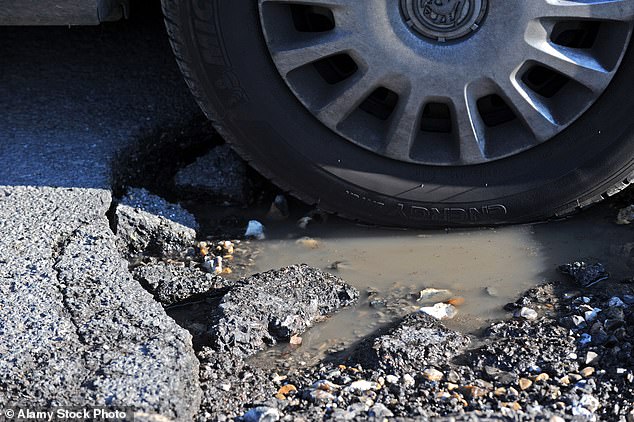I recently drove down a private road which was in poor condition and my front wheel caught a pothole. It’s damaged my car and now I face a big repair bill.
How do I make a claim to get this money back?
J.K. Ipswich, Suffolk.

The growing number of potholes are causing more and more damage to vehicles, but if it happens on a private road, can you claim for any problems they cause?
Consumer rights lawyer Dean Dunham replies: In most circumstances when you damage your vehicle after hitting a pothole you will direct a claim for compensation at the organisation with responsibility for the public highway in question.
This is often the local council or Highways Authority. The law in this case is the Highways Act, which sets out the obligations and responsibilities when it comes to public highways.
However, when the pothole is on a private road these authorities bear no liability, and the Highways Act does not apply.
Instead, responsibility for the private road lies with the person or entity that owns the road. The rules for private roads are set out in the Occupiers Liability Act 1984 for England and Wales; the Occupiers’ Liability Act (Northern Ireland) 1957; and the Occupiers’ Liability (Scotland) Act 1960 in Scotland.
Under both laws, the basic legal principle is that the owner of the private road has a duty to keep it safe. And if there is a danger present (such as a pothole) and the owner knows or ought to know about it, there is a responsibility to either make it safe (i.e. repair the pothole) or provide adequate warnings for users of the road.
Your first port of call here is to find out who owns the private road and to write to them citing all the relevant information. Include the date and time the damage was caused, precisely where on the road the pothole is, the size of the pothole and the cost to repair the damage caused. You should also cite the relevant law above.
Sometimes these claims are straightforward if the private road is owned by a supermarket or property developer and therefore leads to a public shopping area.
However, when the road is owned by a private individual and leads to or past their private property it can be more tricky. You should, therefore, also consider whether it would be easier to make a claim on your car insurance, although this could affect your premium.
My bank’s fraud team blocked a payment when I tried to buy a sofa — by the time it was allowed the sofa had sold out — now I can only find it for £100 more
Can I ask for compensation?
C.C. Epping, Essex.

Blocking transactions has become an everyday practice for banks and is perfectly acceptable in most cases, writes Dean Dunham
Dean Dunham replies: Banks are becoming increasingly careful with money transfers in a quest to combat the escalating amount of Authorised Push Payment (APP) scams, where consumers are tricked into transferring money from their bank accounts to fraudsters.
Most banks are also signed up to a voluntary code (the Contingent Reimbursement Model Code) in which they have agreed to take steps to increase customer awareness in relation to scams, to do more to prevent these scams and to reimburse customers in certain circumstances.
As a result, blocking transactions has become an everyday practice for banks and is perfectly acceptable in most cases.
A bank generally should process payment requests within 24 hours unless there are good grounds to take longer. Interestingly, new legislation being introduced by Government will give UK banks the power to pause payments for up to 72 hours if they suspect a customer is being scammed.
This is a clear indicator it is deemed acceptable and reasonable for banks to delay payments while they investigate.
In most circumstances it will therefore be unlikely that you could claim compensation from a bank for a blocked payment.
However, banks do need to act responsibly and if you can show that a) your bank took more than 24 hours to process a payment without good reason and b) you suffered a loss as a consequence, it could give rise to a claim.
If you find yourself in this situation, the first step to take would be to complain to your bank and ask for compensation.
If it says no (and in most cases this will be the response to a claim such as this) your next step would be to lodge a claim with the free Financial Ombudsman Service. But be prepared, your circumstances will need to be extreme to be successful.



